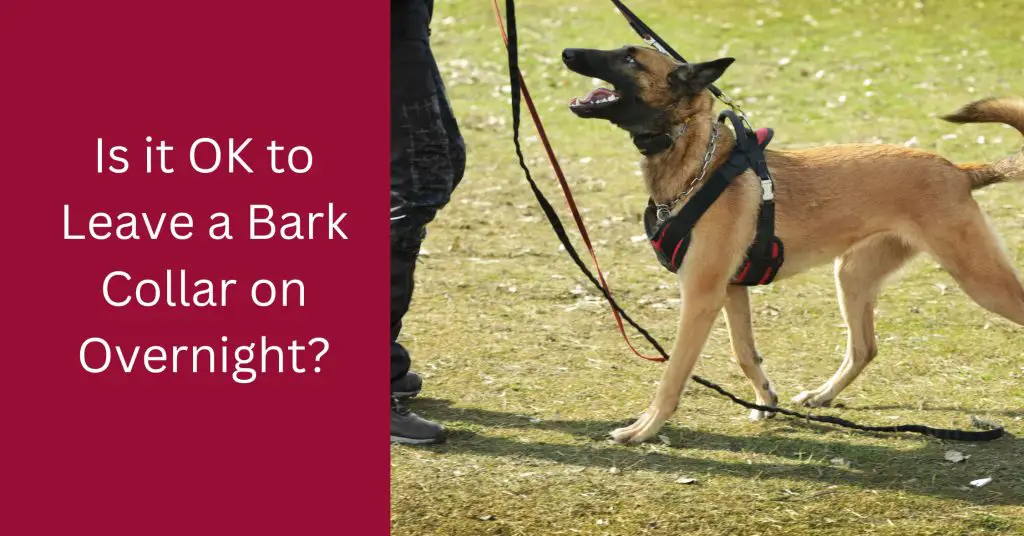
If you’re a dog owner dealing with excessive barking, you’ve probably considered using a bark collar.
These collars are designed to help curb unwanted barking behavior in dogs. However, the question arises:
Is it OK to leave a bark collar on overnight
In this article, we will delve into the ins and outs of using bark collars, addressing concerns, providing valuable information, and sharing expert advice to ensure the well-being of your furry friend.
Is it OK to Leave Bark Collar on Overnight? – Understanding the Safety Concerns
Before we dive into the details, it’s crucial to address the safety concerns associated with leaving a bark collar on overnight.
Dogs are sensitive creatures, and their comfort and safety should always be a top priority.
Leaving a bark collar on for an extended period can lead to potential issues, such as skin irritation or discomfort. Therefore, it’s essential to follow certain guidelines to ensure safe usage.
The Importance of Proper Fit and Monitoring
When using a bark collar, ensuring a proper fit is paramount. The collar should be snug but not too tight to cause discomfort.
Regularly check the collar to avoid any signs of chafing or irritation.
Dogs can sometimes develop skin sensitivities to certain materials, so monitoring their response to the collar is crucial.
Alternatives to Overnight Usage
While using a bark collar during the day for training purposes can be effective, overnight usage might not be ideal.
Instead, consider alternative solutions like crate training or providing a cozy sleeping environment to minimize barking triggers.
Addressing the underlying causes of excessive barking can yield more long-term benefits.
Understanding the Different Types of Bark Collars
Not all bark collars are the same, and understanding the different types can help you make an informed decision.
These are the best dog collar to stop barking
The main categories of bark collars include:
- Static Bark Collars: These collars deliver a mild static correction when the dog barks, which is designed to interrupt the behavior.
- Ultrasonic Bark Collars: Emitting high-frequency sound waves, these collars are meant to startle the dog and discourage barking.
- Citronella Bark Collars: These collars release a burst of citronella spray near the dog’s nose, acting as a deterrent. check this article is it ok to use citronella collar?
- Vibration Bark Collars: Vibration collars offer a gentle vibration to divert the dog’s attention from barking.
Ensuring Comfort During Daytime Use
If you decide to use a bark collar during the day for training purposes, ensuring your dog’s comfort is crucial. Here are some tips:
- Regular Breaks: Allow your dog to have collar-free intervals during the day to prevent any discomfort or irritation.
- Positive Reinforcement: Combine bark collar usage with positive reinforcement techniques to encourage good behavior.
- Comfortable Material: Opt for collars made from soft and breathable materials to minimize skin irritation.
FAQs
Q: How long can I leave a bark collar on my dog during the day?
A: It is recommended to use the bark collar for a maximum of 8 hours during the day, providing regular breaks in between.
Q: Can bark collars be harmful to my dog?
A: When used correctly and with proper monitoring, bark collars are generally safe. However, it’s essential to follow guidelines and ensure your dog’s comfort.
Q: Should I leave the bark collar on when my dog is alone at home?
A: It’s generally not advised to leave the bark collar on when your dog is unsupervised. Opt for other training methods to address separation anxiety and barking.
Q: Are there any alternatives to bark collars?
A: Yes, alternatives include positive reinforcement training, crate training, and addressing the root cause of barking.
Q: Can I use a bark collar on a puppy?
A: Bark collars are not recommended for puppies, as they are still developing and require positive reinforcement training.
Q: How can I prevent my dog from becoming dependent on the bark collar?
A: Use the bark collar as a temporary training aid and gradually phase it out as your dog’s behavior improves.
Conclusion
In conclusion, using a bark collar can be an effective way to address excessive barking in dogs. However, it’s essential to prioritize your dog’s safety and comfort by following proper usage guidelines.
Avoid leaving the collar on overnight, and instead, use it during the day with regular breaks.
Always monitor your dog’s response to the collar and consider alternative training methods to ensure a happy and well-adjusted furry companion.
Remember, each dog is unique, and what works for one may not work for another. Be patient and understanding as you train your dog to reduce excessive barking.
With the right approach and care, you can create a harmonious environment for both you and your beloved pet.

